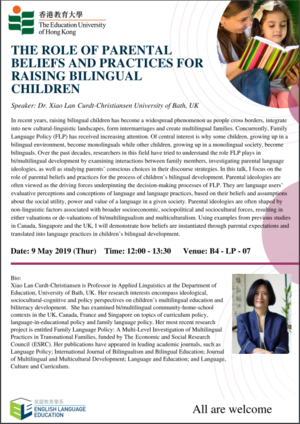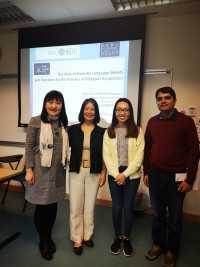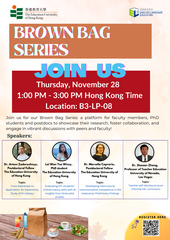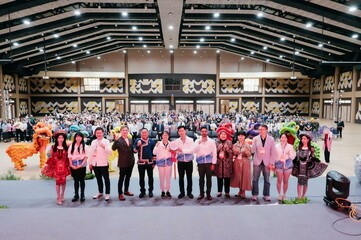The Role of Parental Beliefs and Practices for Raising Bilingual Children
- 2019年05月09日 | 12:00 - 13:30
- B4-LP-07
- 講座
- 英語
- Dr Xiao Lan Curdt-Christiansen
- 英語教育學系
Speaker: Dr. Xiao Lan CURDT-CHRISTIANSEN (University of Bath, UK)
In recent years, raising bilingual children has become a widespread phenomenon as people cross borders, integrate into new cultural-linguistic landscapes, form intermarriages and create multilingual families. Concurrently, Family Language Policy (FLP) has received increasing attention. Of central interest is why some children, growing up in a bilingual environment, become monolinguals while other children, growing up in a monolingual society, become bilinguals. Over the past decades, researchers in this field have tried to understand the role FLP plays in bi/multilingual development by examining interactions between family members, investigating parental language ideologies, as well as studying parents’ conscious choices in their discourse strategies. In this talk, I focus on the role of parental beliefs and practices for the process of children’s bilingual development. Parental ideologies are often viewed as the driving forces underpinning the decision-making processes of FLP. They are language users’ evaluative perceptions and conceptions of language and language practices, based on their beliefs and assumptions about the social utility, power and value of a language in a given society. Parental ideologies are often shaped by non-linguistic factors associated with broader socioeconomic, sociopolitical and sociocultural forces, resulting in either valuations or de-valuations of bi/multilingualism and multiculturalism. Using examples from previous studies in Canada, Singapore and the UK, I will demonstrate how beliefs are instantiated through parental expectations and translated into language practices in children’s bilingual development.








